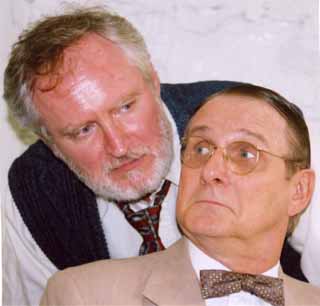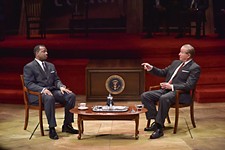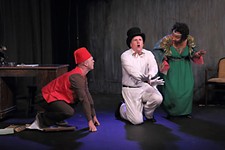The Flame Keeper
Local Arts Reviews
Reviewed by Robert Faires, Fri., Aug. 2, 2002

The Flame Keeper: A Private Little War
Dougherty Arts Center,
through August 18
Running Time: 1 hr, 35 min
Wars don't end just because a peace treaty gets signed. Governments may lay a conflict to rest, but it can live on in the hearts of the combatants, in their hatred of the enemy that burns like a flame, one they're loath to extinguish. For survivors who shelter that fire against the wind of peace, the enemy is still the enemy, the war rages on; all that changes are the battlefields and weapons. Instead of in fortresses, trenches, and encampments, the skirmishes take place in shops, cafes, and parks; in place of bombs and bullets, the warriors use snubs and condescension, slighting their foes in business transactions and the little public exchanges of everyday life.
Playwright Amos Kamil writes of just such a war in The Flame Keeper. It's fought in late 1940s Berlin, in a tobacconist's shop, where a man named Julius Reiter is laying siege to the proprietor, Ernst Gruber. His attacks occur daily, beginning at the precise moment the shop is supposed to open, and include making repeated inquiries of Herr Gruber -- what cigars are in stock, what do they cost -- even when he's been given the answers, asking to see premium cigars from the top shelves -- a task that's difficult and painful for the limping shopkeeper -- then refusing to buy them, eventually opting for the cheapest cigar and having Gruber keep relighting his meager selection.
Reiter believes Gruber to be his enemy. But he comes to learn, as do we, that enemies are not always where we see them, that sometimes the foe who is most dangerous -- and most difficult to see -- is the one within. What begins as one kind of conflict, the black-and-white war between Nazi and Jew, shifts into another, a struggle over identity and responsibility shaded in gray. The two debate what it means to be a Jew and a German, to believe in God or not to believe. This battle transcends the first, moving beyond issues of blame and revenge to the heart of who these men are, to the choices they made in the war and that they will make in its wake, to the nature of the fire they've nurtured inside themselves all this time. Is it a flame of memory or retribution?
With a single setting, one act, and two actors, Kamil's play is decidedly simple in form. And this Remembrance Through the Performing Arts production often reflects that simplicity. Nicole Smith uses minimal shelving and furniture to suggest the shop and a few symbolic elements -- strands of barbed wire, painted swastikas with the phrase "Arbeit Macht Frei" -- to project the war's presence in these men's lives. Diana Duecker's lighting and Rosalyn Rosen's costumes fulfill their functions while calling little attention to themselves. And Shana Gold's direction is straightforward, moving the men among the counter and shop tables as they argue. If the blocking, like the characters' debate, occasionally grows repetitive, it doesn't undercut the force of the drama.
For while The Flame Keeper is simple as a play, it is not simplistic. It grapples with issues of great complexity -- how does our heritage define us, can tradition survive in a world that prizes change, what are our responsibilities in preserving the past -- and offers no pat answers. And while the play speaks specifically to Jews, its scope is broad enough to strike a chord in anyone who has left a small town for a city, who has married outside their faith, who has stopped celebrating holidays with the customs of their native culture.
In his script, the playwright presents the opposing views on these questions with equal force and passion, and he is fortunate here to have the two sides of his debate embodied by actors as skilled as Thomas C. Parker and Michael Costello. They provide the necessary contrasts of character -- Costello's movement and speech as casual as his loose, rumpled clothing; Parker neat and clipped, as stiff in his demeanor as in his gait -- but both also project a rock-solid conviction in the righteousness of their positions, and the friction when they come into contact ignites the drama. Their performances communicate the pain of having lived through war and take us through the pain of discovering another war in one's own soul.










